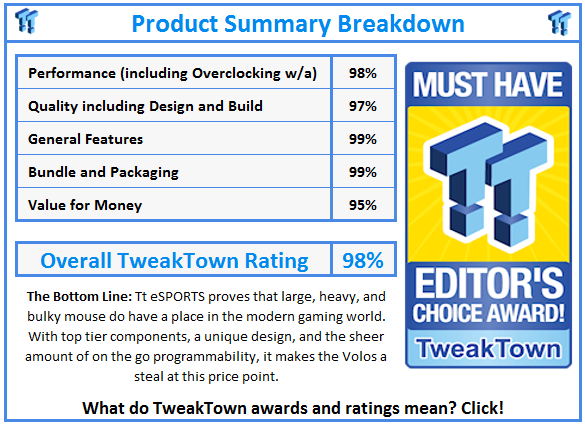Introduction

In my short time reviewing peripherals, one company that has kept me fairly busy is Thermaltake and their eSports lineup. I have seen everything from the basic designs with high-end components, on up to the engineer's wet dream of a mouse in the Level 10M. What I have seen tells me that Thermaltake and the eSports crew are good at two things. One of the most important is that they use top-tier components inside of these mice to give the customers ease of use and great longevity. The other thing I noticed is that they aren't afraid to try new things, and have no barriers to restrict them like other manufacturers who do very minor things to an old design and reintroduce it as something spectacular and new.
Breaking the barriers between mice and console gaming controllers is what brings us here today, as we look at the latest mouse that has been delivered for us to have a look at. Think of it like this. In simple terms, you are given a wide, heavy, and well contoured design of the mouse, there are also seven buttons designed for normal uses, but on top of those there are four other special buttons.
These buttons are designed to replicate the feel and look of console controller buttons found on both the Xbox 360 and the PS3. By that, I mean that the four buttons have the PS3 iconography, but the colors of each switch mimic those of the Xbox controller. Any way you look at this slick addition, you now have 11 buttons at your command to decimate the competition in your favorite games that require Macros or spamming of commands.
There is plenty more than just the basic idea we covered here. Top tier components, slick and stylish aesthetic additions I have never seen prior to this, and a feel that not many other mice can offer users. For those of you that are still interested, continue on with us as we cover the rest of the Thermaltake eSports Volos laser gaming mouse. There is a ton still yet to cover, so strap in and enjoy the show as we take you inside and around the outside of this mouse to see just what is going on with the Volos.
Specifications, Availability and Pricing
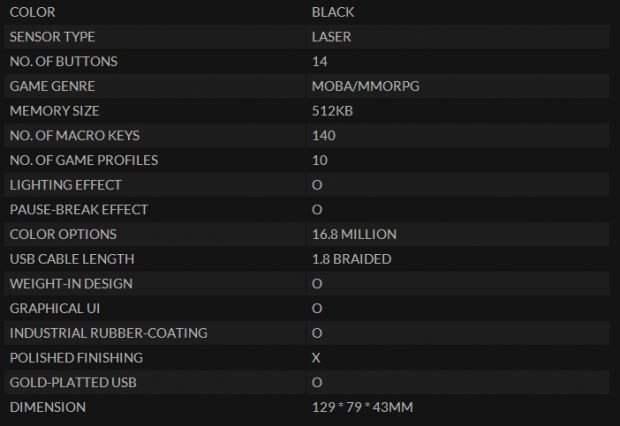
The Volos does come in two colors. There is a white version of this as well, but we were sent the black version for testing. This mouse is based off the Avago ADNS 9800 laser sensor that offers up to 8200 DPI, and it designed with battle arena and MMORPG games in mind. The Volos also offers 4MB of onboard memory to control the ten profiles and up to 140 Macros, and be able to use them on the go, without the need to be connected to a base computer with the programming software.
There are lights with a full choice of 16.8 million colors to choose from, and the battle dragon logo will illuminate with a breathing effect. As the list continues, it covers the 1.8 meters of braided cabling and the gold plated USB 2.0 connection. It also shows that there are adjustable weights, software, a rubberized coating, the dimensions, and while it shows there is no polished finish, there are bits of the mouse that are.
Inside of the Volos, there are Omron switches under only the right and left click buttons, but are good for five million clicks of lifetime. For the console buttons, there are thin metal pad switches used, due to clearance restrictions, while most of the other buttons are ZHIJ switches. There are also thinner switches that look like the ZHIJs used, but due to clearance again, these are lower profile versions to back the five switches marked A through E. We covered the Avago sensor that is tracking all of the motion, but there is the NXP 32-bit ARM processor inside of here, and the MXIC memory chip to store on, converse with the PC, and offer the best laser sensor on the market currently.
As I write this, the Tt eSPORTS Volos is widely available. Looking for it via Google shopping, you will find the pricing ranging from $67.33 on the low-end on up to and over $110. On the lower-end of the spectrum is Amazon with a listing of $67.34, offers free shipping, and for $6 more, you can extend the warranty another two years. Newegg falls slightly behind here with a listing of $69.99 and another $2 for shipping, but for some reason they are showing no stock currently where everyone else is.
The near $70 pricing is on the higher-end of reasonable pricing for the masses, but in no way is out of the reach of average users. For what was delivered to me, all encompassed, I feel that the pricing is a good deal and well worth the investment. For those of you who doubt that claim, feel free to continue reading and see what Thermaltake and the Tt eSPORTS crew are up to now - I think the Volos will speak for itself.
Packaging
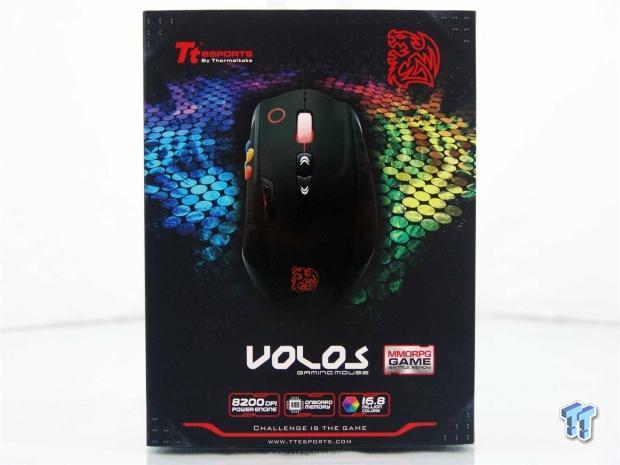
The packaging on the front is quite brilliant with the colors behind the image of the Volos, which hint at the color option offered in this mouse. With the company name and logo at the top, the features are shown at the bottom covering the 8200 DPI, 4MB of memory and the 16.8 million color choices.
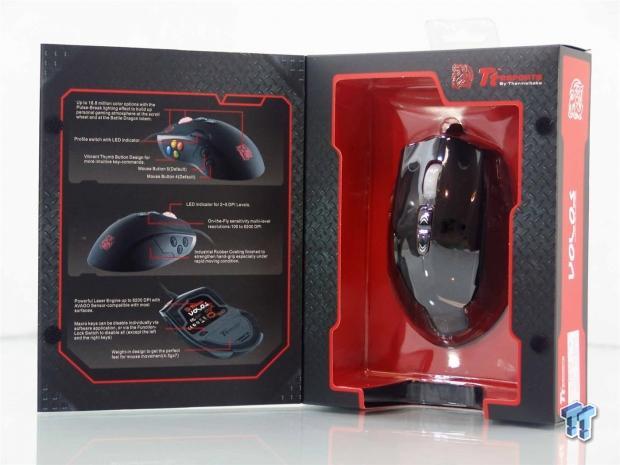
Lifting the front panel exposes the mouse behind a layer of plastic on the right side. The back of the front panel offers three images with 11 features being pointed out around and under the Volos.
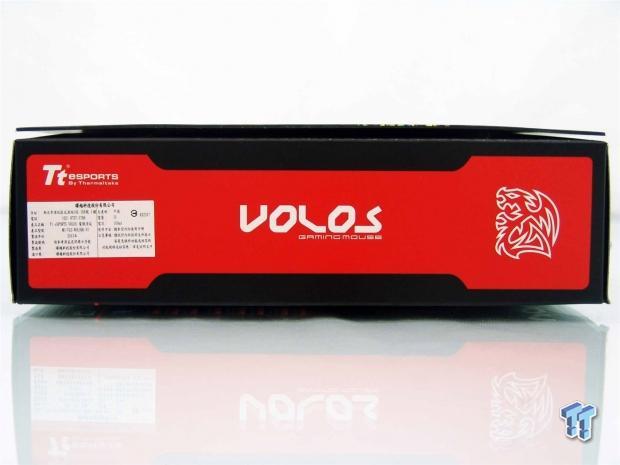
Typical of anything eSports related, the sides of the Volos packaging have the large red bar going across with the company name, product name, and the battle dragon logo.
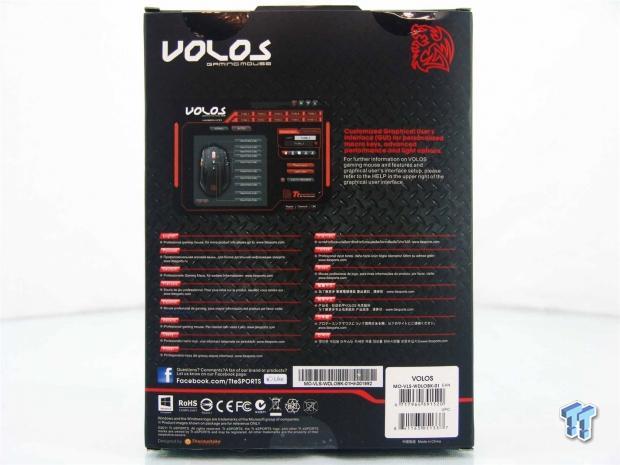
On the back of the box, there is even a peek at the software used to control the Volos at the top half. At the bottom, in 15 languages, it states "Professional gaming mouse, for more product info please go to www.ttesprts.com".
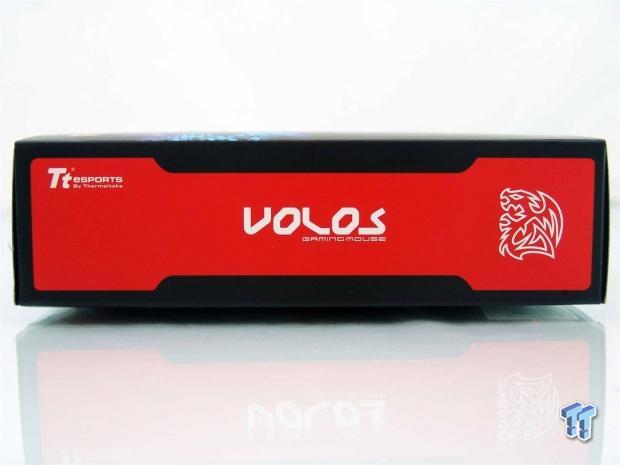
The last side to cover again mimics the opposing side of the packaging. This time it is lacking the sticker that I cannot read, but offers the same naming and logo.
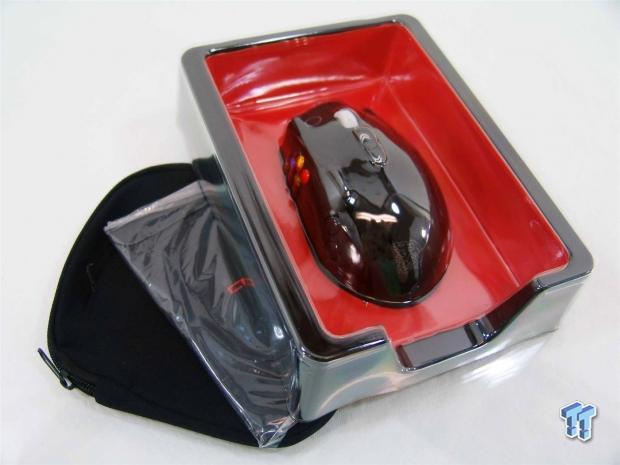
Inside of the cardboard outer packaging, you will find the mouse secured between two layers of plastic as a second layer of protection. Under that, you will find a travel pouch for the Volos to fit inside of, along with a folder full of paperwork.
TT eSPORTS Volos Laser Gaming Mouse
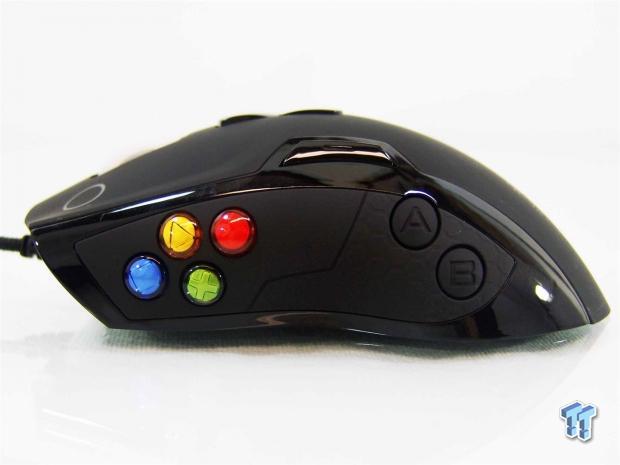
On the left side of the Volos, there is a lot to cover. There is the mix of rubberized coatings against the polished plastic, as well as the hexagonal design imbedded into the back section. Then there are the buttons - four at the front that play to both major console brands that can be set for anything, and the A and B buttons that are page forward and back by default.
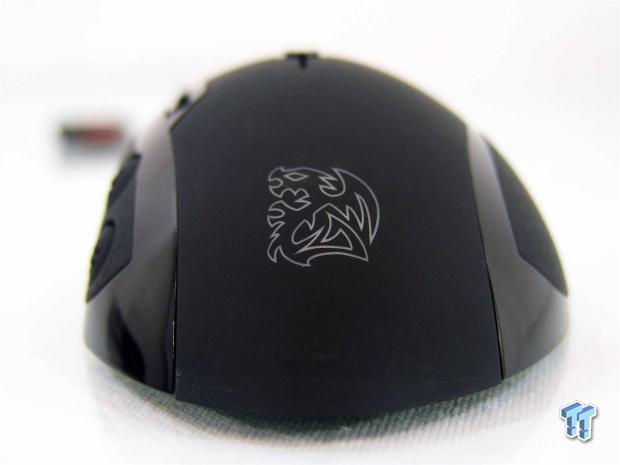
The heel of the Volos slopes gently to the table top, fitting the hand very well. The center section of the mouse is also rubberized, but in the heel there is the battle dragon logo that will "breathe" on and off, when the mouse is powered.
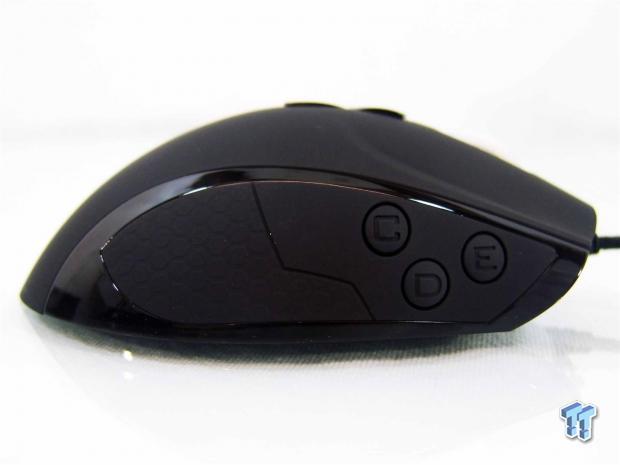
The right side of the Volos is bulbous and allows fingers to gently wrap around it. There is again a polished section of plastic surrounding the hexagonal designed and plain rubber surfaces. Here you also have the C, D, and E buttons that are also programmable.
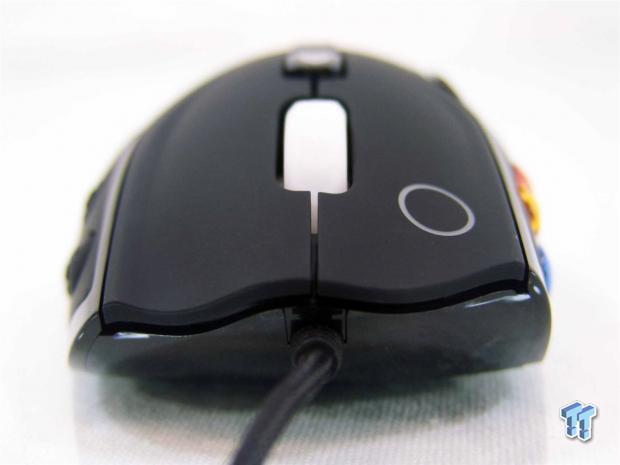
At the front of the Volos, the concave shape of the right and left click buttons is much more obvious and is designed to comfortably accept your fingers and help to settle them on the buttons. There is a white scroll wheel and a white circle on the left click button that will also illuminate, and are separately controlled in their lighting.
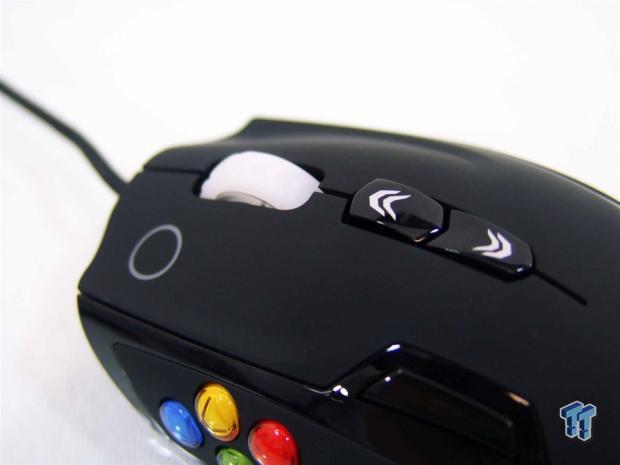
On the top, just behind the scroll wheel, there is the DPI up and DPI down buttons to go through the four programmable settings in each profile. Speaking of profiles, the button at the bottom of this image, slightly out of focus, is the profile button that runs through the ten profiles.
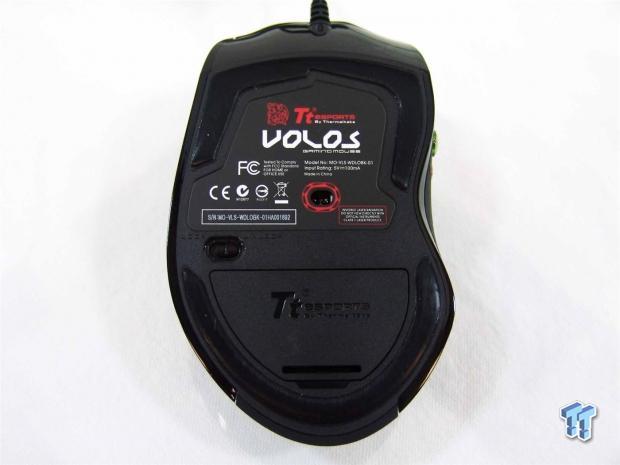
Thermaltake designed the Volos to work with two thin, but wide feet. The front foot wraps the entire front edge as well as a bit of the sides, as does the back foot, as it swings around the bottom. The eye of the sensor is in the sticker, there is a lock switch, and there is also a removable cover over the adjustable weighting.
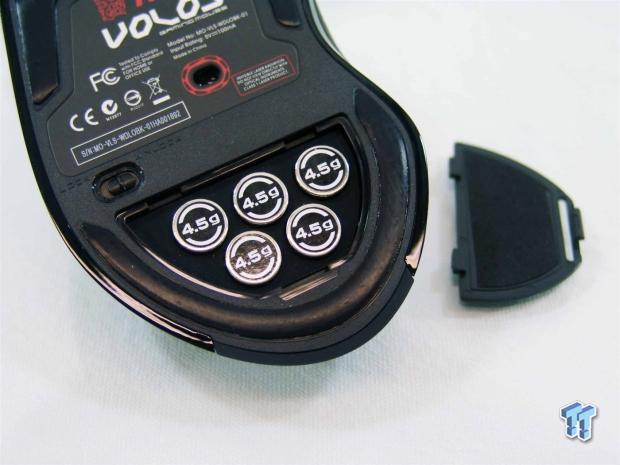
After removing the foam backed cover, located in the mouse, there are five 4.5 gram weights visible, but there is a total of 31.5 grams of adjustable weighting to shift around to customize the feel of the Volos.
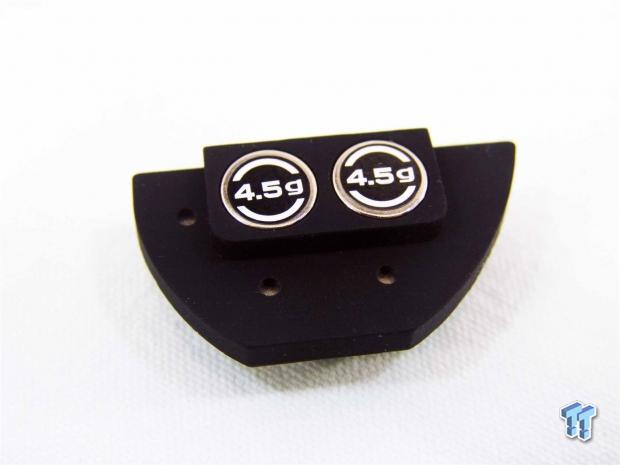
This is how Thermaltake got the extra nine grams of weight into the mouse. If you remove the rubber holder from the previous image, and flip it over, you find the two weights.
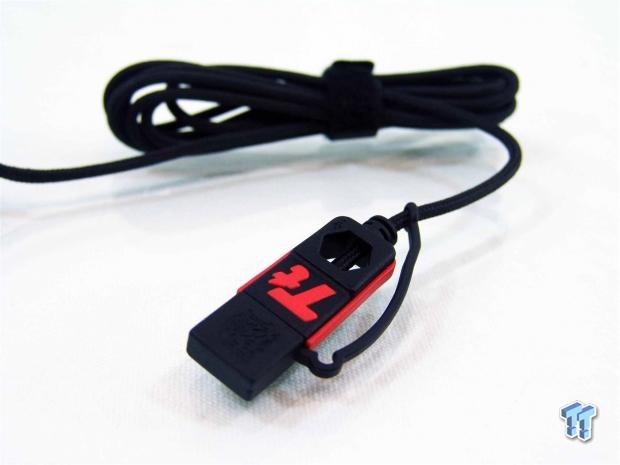
Connecting the Volos to any PC is the 1.8 meters of braided cabling that ends in the red and black USB 2.0 connection. Under the tethered USB connector cap is a gold plated connection. The cover and the Velcro tie strap will make travelling with the Volos much easier and offers further protection.
Accessories and Documentation
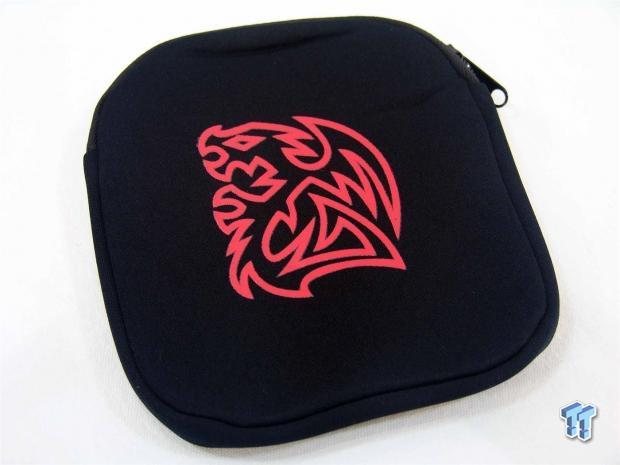
Along with the Volos, there is a padded cloth travel bag. This black bag comes with a zipper to securely close it, is obviously black, and has a very large battle dragon logo on the top side, the underside is plain.
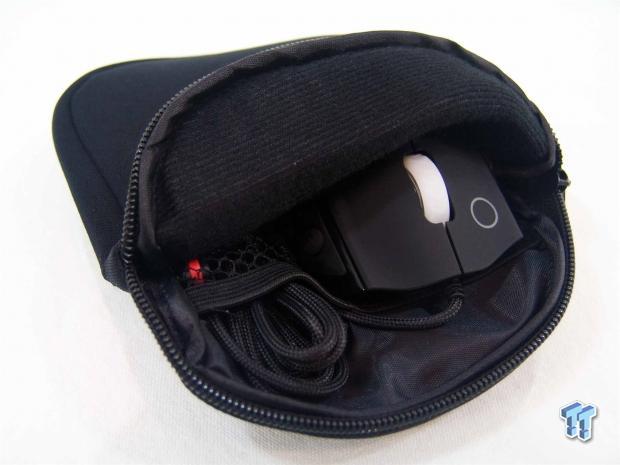
The inside of the bag is lined with Velour like material to softly protect the Volos and the cabling inside of the bag. Also the inside offers a large area for the mouse, and also offers two mesh pouches to stash thumb drives or the cabling.
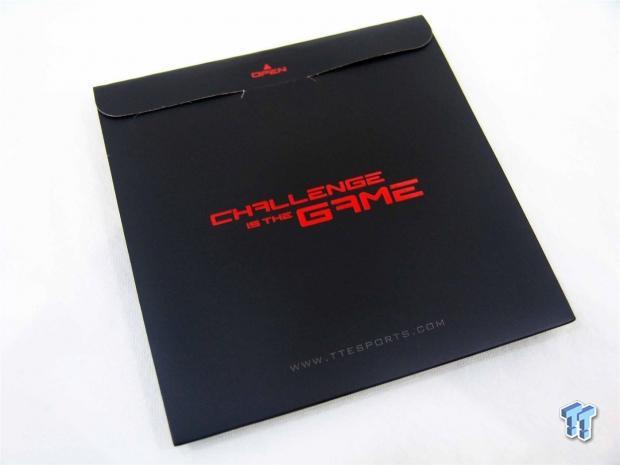
There is also the black folder that contains all the paperwork for the Volos. The obverse side offers a large battle dragon logo like the travel bag has, but this side states that "challenge is the game", and delivers the site address at the bottom.
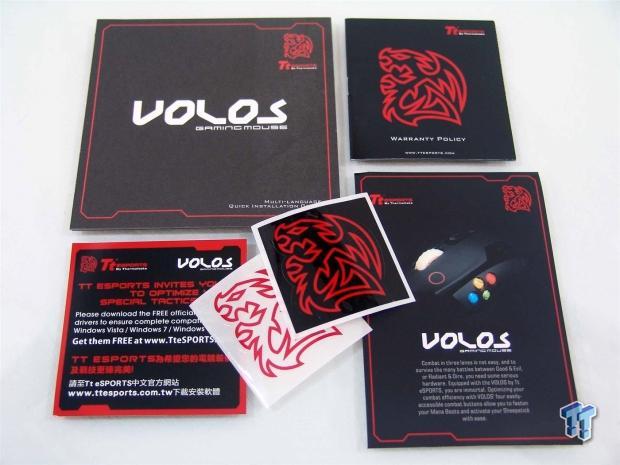
Inside of the folder, there is the user manual, warranty policy information, a card asking that users install the latest drivers to gain full functionality of the Volos, there are two battle dragon stickers, and another pamphlet on the mouse and button functionality.
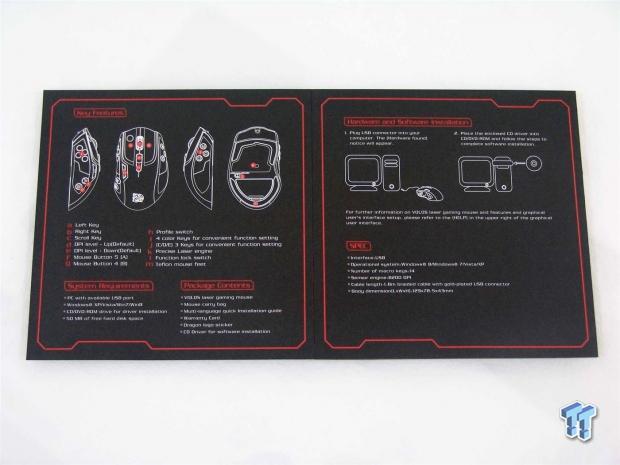
Inside of the user manual, there are four images of the Volos with designated red dots pointing out various features. Below those there is the list of each of the points that the dots denoted. There are also system requirements, package contents, hardware and software installation, and the specifications that also get covered in this.
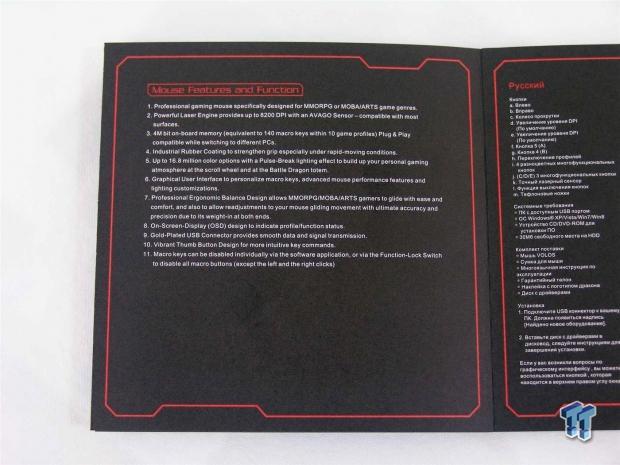
The last bit of information outside of the two year warranty would be the 11 features listed in the manual before it switches over to another language repeating what we just discussed.
Inside of the Volos

After bypassing some tricks the engineers used to keep users from tearing apart the Volos, we now have it broken down into its four major components. If there is any need for voiding the warranty, be careful when you remove the top, there is a very short ribbon cable running to the left side section.
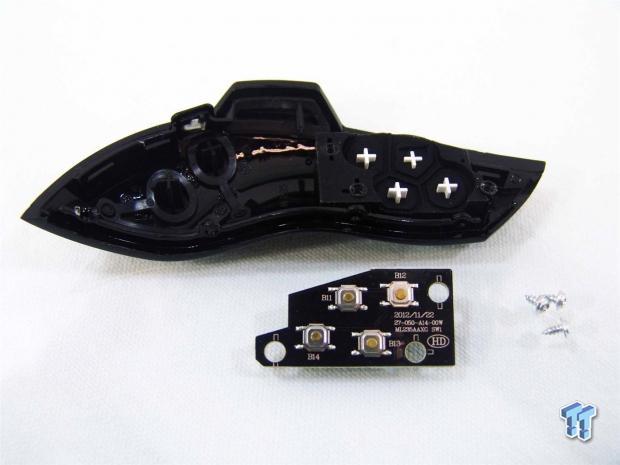
The left side of the Volos offers a smaller PCB with four thin metal pad switches to back the four console buttons near the front. As for the A and B buttons, they hit switches in the bottom section of this tear down.
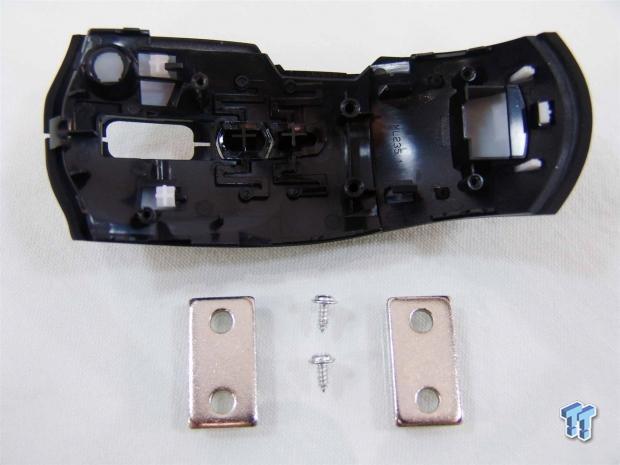
The top section holds the DPI selection buttons in the plastic subsection, and again presses switches on the lower section of the Volos. There are also two steel weights that are more permanent, and are close to 30 grams of total weight.
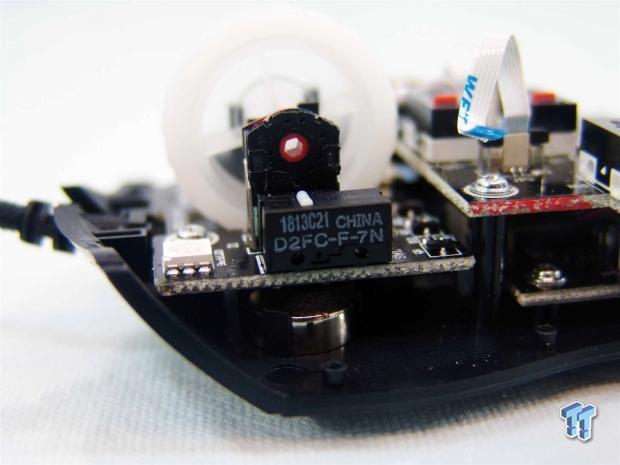
At the front of the lower section, on the left side, the first thing seen is the Omron D2FC-F-7N switches that offer five million clicks worth of a lifetime. There is also a large LED in front of it that backlights the white circle on the left click button.
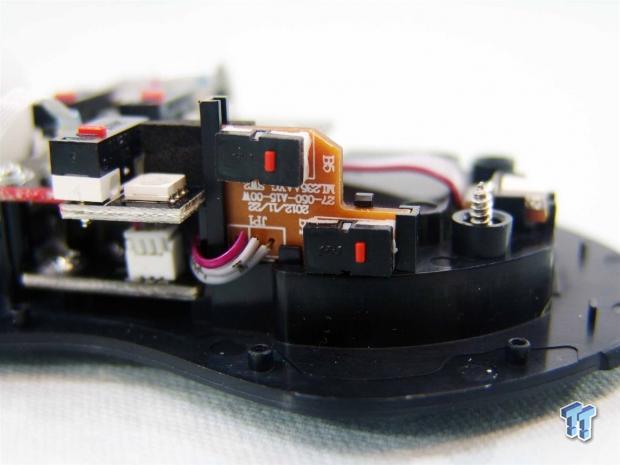
Without pulling these switches to look for any lettering or identifying marks, it is rather tough to search for them by a logo on the switch cover. These do come in a slimmer design than the ZHIJ switches, but have a similar feel and activation pressure.
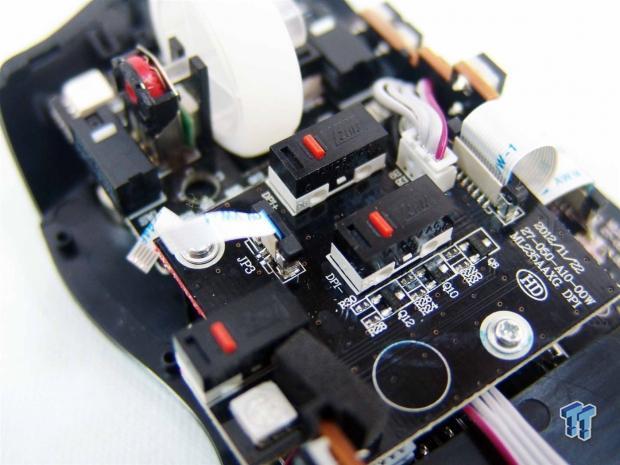
The PCB on the top tier behind the scroll wheel offers room for the ZHIJ switches that back the DPI selector buttons, as well as the profile button to the left that is out of focus.
Inside the Volos Continued
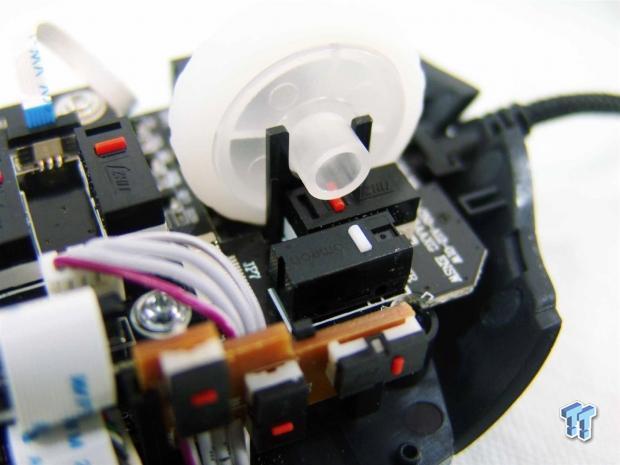
Under the scroll wheel there is yet another ZHIJ red switch for the click function of the wheel. Under the right click button there is a match to the Omron switch we saw on the left.
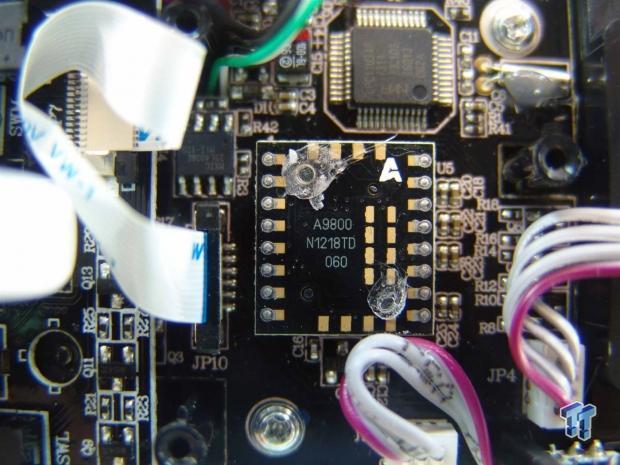
Removing the top PCB of the bottom section of the Volos, we uncovered the Avago ADNS 9800 sensor that allows this laser sensor to offer up to 8200 DPI.
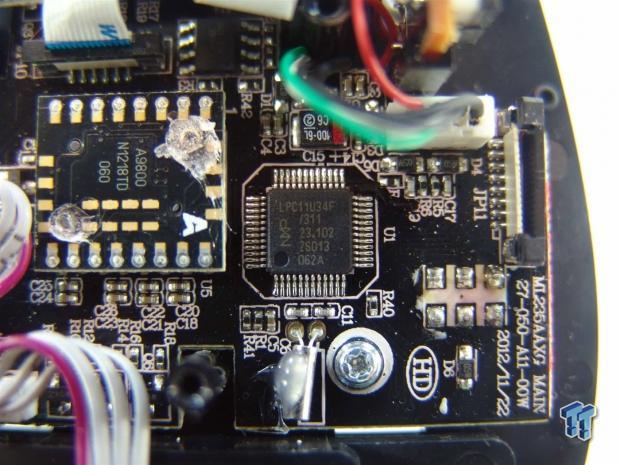
Next to the laser sensor there is the NXP LCP11U34F 32-bit ARM Cortex microprocessor. This is what will be doing all the talking between the buttons, the onboard memory and the PC.
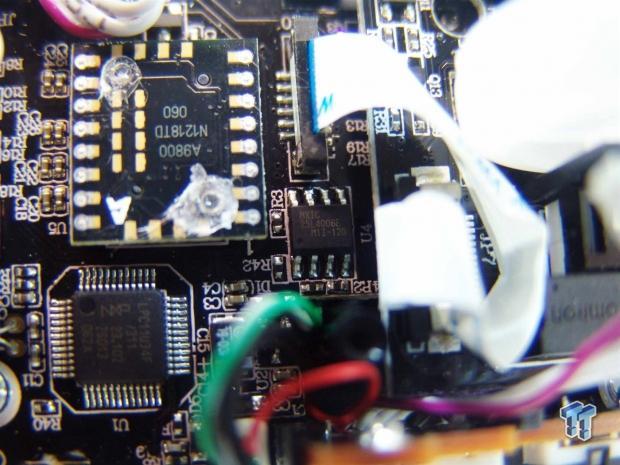
Digging deeper, and having to move cabling and wiring to expose it for this image, there is the MXIC 25L4008E BIOS chip that is used for the onboard memory offering 4MB of storage for the ten profiles and 140 Macros possibilities, and not need the software to use them on the go.
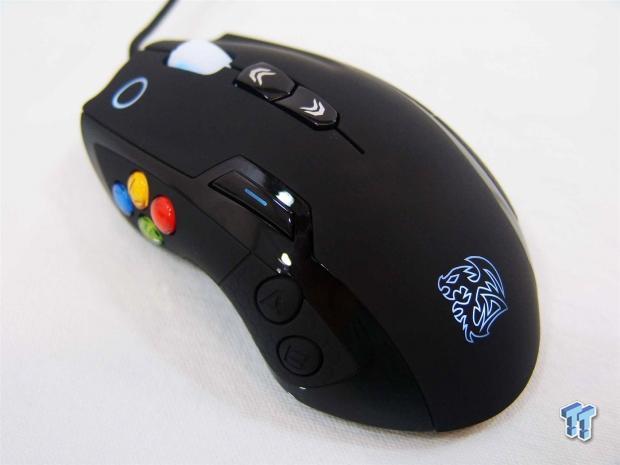
After rebuilding the Volos, when it is first powered up, the default coloring of the LEDs is red. Flipping through the profiles button, I found the white LEDs and used them to get the image of the profiles button, the battle dragon, the circle on the left button, and the scroll wheel all illuminated in white.
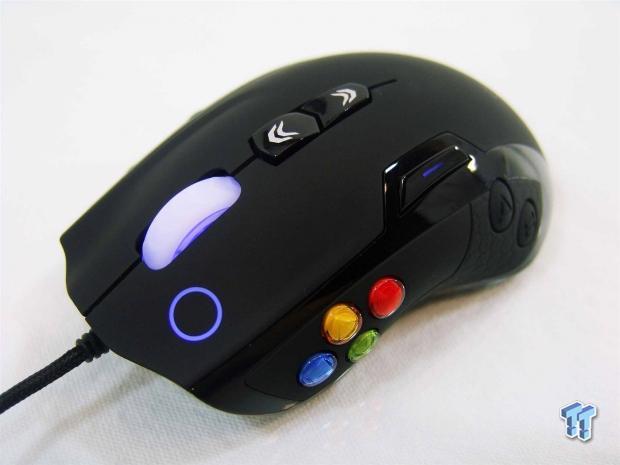
Flipping the mouse around and again changing the profiles, the Volos is now illuminated with blue LEDs, but at the time I clicked the camera, the battle dragon logo was on the off swing of the pulsated "breathing" mode.
Software
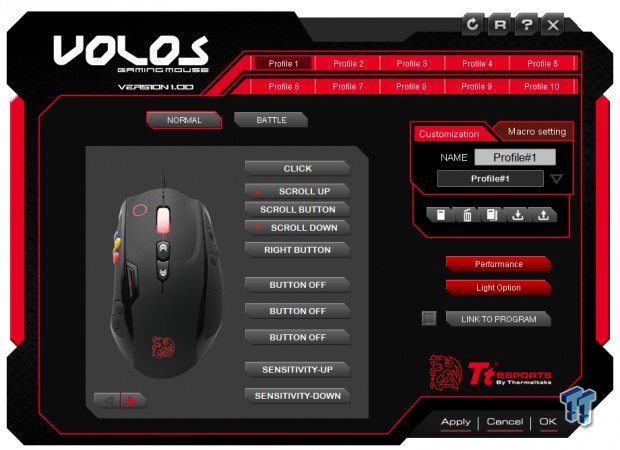
Once the Volos is plugged in, find your way over to Tt eSPORTS website and download the software. Once installed and started, the Volos software opens with this window. At the top there are ten profiles you can choose from. Once one is selected, you can move to the lower section where you can program the buttons or see what they do as default. Normal mode will allow the LEDs to stay on in your color choice, and battle mode makes the Volos light up when you click on any button. You can also rename the various profiles at the right by the Macro tab.
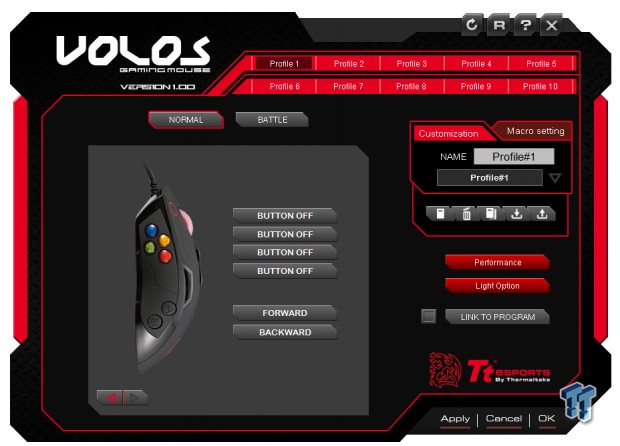
For this image, all we did was click on the right arrow in the bottom left corner. That allows the software to show you the left side of the mouse and change the functionality of the six buttons found there.
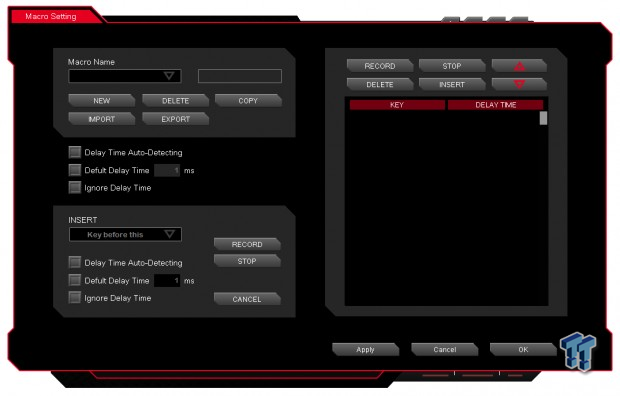
Back to that Macro tab. After clicking it, you are offered a whole new window. Here, just click on new, name the Macro, and get at recording. There are time delay options as well as the ability to import Macros from lists that you may have designed on previous mice.
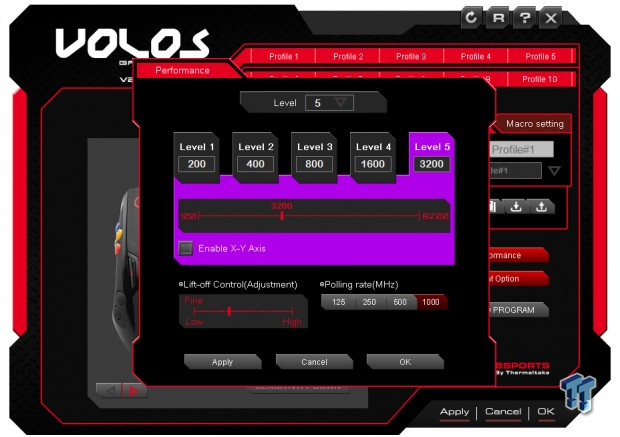
The performance button on the main page also brings up another window. The level at the top at 5 is the mouse sensitivity, and just below you can set the five levels of the DPI buttons. Here there are options from 100 DPI up to 8200 DPI to be selected for each stage. There is the option to enable individual controls for the X and Y axis, LOD control, and an adjustable polling rate from 125Hz to 1000Hz.
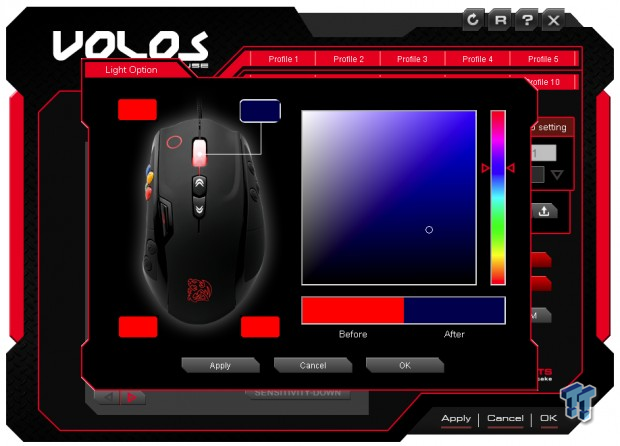
Under the Light Options tab, this window is presented. At this point, you can select one of the four lights to the left covering (clockwise) the circle on the left click button, the scroll wheel, the battle dragon logo, and the profile button LED. To change the color, click on a box, click on the general color choice in the bar to the far right, and once that is done, the larger color choice window allows you more finite color choice under the general color. It also gives you a live look at the new color choice at the bottom previous to hitting the apply button to make it take effect.
Final Thoughts
Coming out of the gate as blunt as I can, the Volos is large, wide-bodied and heavy - there is no way to get around those obvious traits - but the Volos still stands tall as Tt eSPORTS and Thermaltake also designed it to overcome these factors. While large, it is very comfortable to use and fits the hand very well. The slight concave section of the left side to accept the thumb, the gentle slope to the right that leave unused fingers comfortable on the right side, and the rubberized section to assure that grip is always there, even when in the heat of battle. Being wide bodied makes the Volos very tough to lift with any dexterity, as your fingers tend to slide up the right side of the mouse. This is easily overcome with the ability of the Avago laser sensor and the 8200 DPI potential.
While I do test the full scale, and still cannot control a mouse accurately at 8200 DPI, I found 3200 DPI to about 5600 DPI to be very controllable and left me with no need to lift the mouse in games. With a mouse as large as the Volos, weight is definitely a factor too, but keep in mind that a very light mouse with this sensor onboard will likely jitter at higher DPI settings, and not be as accurate to use. While it does offer 31.5 grams of adjustable and removable weighting, the mouse without them is still weighty enough that things do not easily get out of control.
With the console buttons and the A through E buttons on the mouse, plus the DPI selection buttons that can also be programmed, you can have ten profiles and the potential for 128 different functionality or Macros. Making this even better is the ability of the Volos and the 4MB of onboard storage, is that you can keep up to 140 Macros across the ten profiles all on the mouse. This means that once you master configuring the Volos software, it is essentially no longer needed, and if you take this mouse to a friend's house, you can plug and play with all of your favorite settings in place. I found that the feel of the mouse is great, and all of the button placements are pretty good, but I did find my hand position needing to shift to reach some of them on the left. In order to have a good feel at the front of the mouse for normal browsing and gaming, you have easy access to the console buttons near the front. Since the Volos is this big, you then have to shift off the back of the Volos to access buttons A and B. Nothing detrimental, but that could make or break timing if you have to search blindly for them.
It did take me a week or so to get completely used to the Volos, and get the buttons set up for my needs, but once I got associated with everything and it was set up to speed up my productivity for work as well as setting up things for the various games I play, and tying in certain profiles and settings to load in the Volos when the game starts, is something I really love about the Volos. Every time you change the profiles or swap the DPI, the scroll wheel will change colors to designate which of them you are currently on, and once you stay there, after about five seconds the light then changes to the defined color associated with the profile you are currently in. There is also an on-screen display at the center of the bottom of the screen that will show DPI adjustments and button presses in real-time, so you have a visual reference to anything you may have accidentally pressed.
When considering everything I have seen, and my time using the Volos, I think the near $70 pricing may be a bit high for some, but nonetheless, the Volos laser gaming mouse is worth every penny to me. Thermaltake has blurred the lines a bit between consoles and PC, delivering a mouse that is more than capable of dominating your game play in MOBA and MMORPGs, but it is even great at desktop level, in FPS, and even the accuracy needed for photo editing. Thermaltake and the Tt eSPORTS crew have broken outside of the box with this design, but still deliver a product that anyone would likely enjoy having on their desk.


